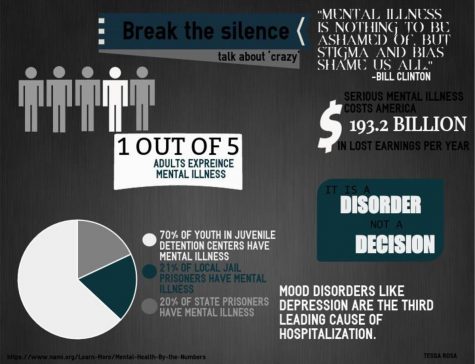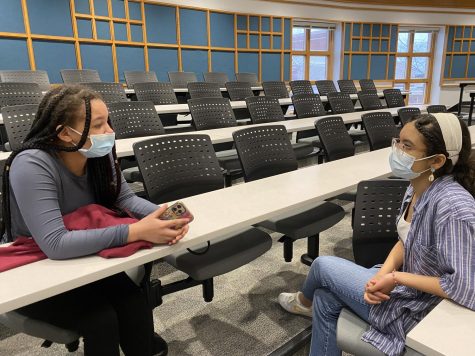Break the silence, talk about ‘crazy’

Shh, don’t talk about it. This is a common phrase that comes into play when mental illness is brought up. People do not like to talk about the subject, it is often reacted to like it is taboo. Mental illness is a serious disease, but most people do not understand it.
Mental illnesses are medical conditions which affect how one can function from day to day. It is more than the little up and down reactions that one experiences, they become some thing longer lasting. Despite that the subject is not frequently talked about, most people have first-hand experiences with mental illnesses of sort.
According to newsweek.com, about 18.2 percent of the population every year suffers from mental illness conditions such as depression, bipolar disorder and schizophrenia.
“Mental illness is very misunderstood. If you break your leg, we put it in a cast. If you break your head we don’t put it in a cast. You can’t see what pain someone is feeling on the inside. [There is] more empathy for physical illness,” history and AP psychology teacher Mike Kaul said.
Mental illness can be hereditary as much as it can be caused by the environment. There are many ways in which people experience stress and other factors which can contribute to disintegrating a person’s mental health. Stress can cause an individual to develop anxiety or depression. It is a well-known fact that stress is not good for the human body, yet little is done to prevent or help the ill effects it has on the mind.
“I think most people just tell you that it’s not that big of a deal or ask you to try harder or ‘think happy thoughts’, but it’s really not that simple,” senior Luke Kurle said.
Mental illness is often associated with words like ‘crazy’, ‘insane’ or ‘psychopathic’, this enforces the stigma and the thought that mental illness is taboo. The media takes the ‘crazy’ spin on it, which only makes society’s view of it stronger. People see the headlines, watch the news and live everyday life seeing how society portrays mental illness. It is not portrayed as a medical condition but as a choice. Being as misunderstood as it is, the belief that it is a choice is popular. It frightens people into locking up the mentally ill, or medicating them.
“Our immediate reaction is to medicate, [we] need to give [people] coping skills instead. In our quick fix society, we just want to take a pill. Medication isn’t bad, it’s a tool that doesn’t work for everyone. It should be a part of the treatment plan, not the whole thing,” Kaul said.
Medication may work, but it is not an all saver. It is not an option that works for everyone, and without proper treatment, people are not going to get better. Mental illness will continue to be as big of a problem if not become a bigger problem than it is today. Currently, many people are out of work and school due to mental illness. It is not something they talk about for fear of being shunned.
“It’s a really serious issue around the world that people don’t really talk about, people act like it’s a made up thing. If we make it a less shameful thing, people will get the help they need,” junior James Cardenas said.
It is important to remember that mental illness has not been portrayed accurately. The media covers mass shootings and other violent acts, claiming the perpetrator is mentally ill and that is why they are violent. However, this is not true.
American Psychiatric Association President Dr. Renee Binder told MTV, “Most people who suffer from mental illness are not violent, and most violent acts are committed by people who are not mentally ill. If you look at that large pool of people, only a tiny proportion of them will eventually commit violence. How are you going to identify them? It’s like a needle in a haystack.”
This portrayal of mental illness has stopped many people from seeking the help they so desperately need. In order to properly raise awareness of mental illness and all that the term encompasses, it needs to be first understood. It needs to be understood by not a few individuals, but the greater mass of the population.
“Once you understand how something works, you are usually less scared of it and react better to it,” Kaul said.

Tessa Rosa is a senior at SAHS and she has a passion for music. At school she participates in Concert Wind Symphony, the jazz band and obviously newspaper....














Cole Lebourgeois • Feb 15, 2016 at 6:18 pm
I like this article because first of all the sources were very well chose, you got quotes from Mike Kaul who teaches this stuff and can give very insightful things on the subject. Also it is very informative to the reader and it also raises awareness in a way.